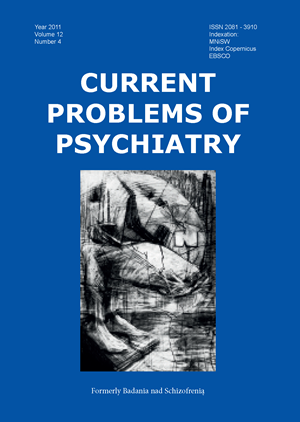The influence of neurocognitive deficits on subjective quality of life in schizophrenic in-patients
Keywords:
schizophrenia, neurocognitive deficits, quality of lifeAbstract
Cognitive deficits are an important dimension of schizophrenia. They are evident in the premorbid period and in the first episode of psychosis and they are moderate or marked. Cognitive deficits are closely linked with community outcome. The domains of quality of life reflect the patient´s difficulties such as side effects, lack of motivation, lack of social contacts and others. Theoretically neurocognitive deficits should interfere with the domains of quality of life of schizophrenic patients. The purpose of this paper was to review the literature and to present the results of our study. We tested hypothesis that cognitive deficits have direct negative impact on quality of life. The research was carried among 100 inpatients. The following instruments were used: The SQOL scale, the BPRS4 scale, the BNS scale, the Calgary scale and the Łucki Verbal Fluency Test as a measure of neurocognitive deficits. The correlations between measurable variables were carried with Spearman coefficient Rxy. In investigated group neurocognitive deficits weakly correlated only with motivation and energy domain of SQOL scale.
References
1. Award G., Voruganti L.P.N., Heslegrave J. A conceptual model of quality of life in schizophrenia: Description and preliminary clinical validation. Qual. Life Res., 1997; 6: 21-26.
2. Voruganti L.P.N., Award A.G. Personal evaluation of transitions in treatment (PETiT): a scale to measure subjective aspects of antipsychotic drug therapy in schizophrenia. Schizophr. Res., 2002; 56: 37-46.
3. Tolman A.W., Kurtz M. Neurocognitive Predictors of Objective and Subjective Quality of life in Individuals with Schizophrenia: A Meta-Analytic Investigation. Schizophr. Bull. Doi:10.1093/ schbull/sbq077 July 11, 2010.
4. Hofer A., Baumgartner S., Edlinger M., Hummer M., Kemmler G., Rettenbacher MA., Scheigkofler H., Schwitzer J., Fleischhacker W.W. Patient outcomes in schizophrenia. I: Correlates with sociodemographic variables, psychopathology, and side effects. Eur. Psychiatry, 2005; 20: 386-394.
5. Heslegrave R., Award A.G., Voruganti L. The Influence of Neurocognitiv Deficits and Symptoms on Quality of Life in Schizophrenia. J. Psychiatry Neurosci., 1997: 22(4): 235-243.
6. Alptekin K., Akvardar Y., Kivircik Akdede B.B., Dumlu K., Isik D., Pirincci F., Yahssins S, Kitis A. Is quality of life associated with cognitive impairment in schizophrenia? Prog. Neuropsychopharmacol. Biol. Psychiatry, 2005; 29: 239-244.
7. The WHOQOL Group. Development of the World Heath Organization WHOQOL-BREF Quality of Life Assessment. Psychol. Med., 1998; 28: 551-558
8. Hofer R.J., Baumgartner S., Bodner T., Edlinger M., Kemmler G., Rettenbacher M.A., Fleischhacker W.W. Patients outcome in schizophrenia II: the impact of cognition. Eur. Psychiatry, 2005; 20: 395-402.
9. Dickerson F., Ringel N.B., Parente F. Subjective quality of life in out-patient with schizophrenia: clinical and utilization correlates. Acta Psychiatr. Scand., 1998; 98: 124-127.
10. Addington J., Addington D. Neurocognitiv and social functioning in schizophrenia. Schizophr. Bull., 1999: 25; 173-182.
11. Heinrichis D.W., Hanlon T.E., Carpenter W.T. The Quality of Life Scale; an instrument for rating the schizophrenic deficit syndrome. Schizophr. Bull., 1984; 10: 388-397.
12. Narvaez J.M., Twamley E.W., McKibbin C.L., Heaton R.K., Patterson T.L. Subjective and objective quality of life in schizophrenia. Schizophr. Res., 2008; 98: 201-208.
13. Savilla K., Kettler L., Galletly C. Relationships between cognitive deficits, symptoms and quality of life. Aust. N. Z. J. Psychiatry, 2008; 42: 496-504.
14. Lipkovich I., Deberdt W., Csernansky JG., Sabbe B., Keffe RSE., Kollack-Walker S. Relationships among neurocognition, symptoms and functioning in patients with schizophrenia: a pathanalitic approach for associants at baseline and following 24 mounth of antipsychotic drug therapy. BMC Psychiatry, 2009; 9: 44
15. Yamauchi K., Aki H., Tomotake M., Iga J., Numata S., Motoki I., Izaki Y., Tayoshi S., Kinouchi S., Sumitani S., Tayoshi T., Takikawa Y., Keneda Y., Tanigichi T., Ishimoto Y., Ueno S., Ohmori T. Predictors of subjective and obiective quality of life in outpatients with schizophrenia. Psychiatry Clin Neurosci., 2008; 62(4): 404-411.
16. Ristner M. Predicting quality of life impairment in chronic schizophrenia from cognitive variables. Qual. Life Res., 2007; 16: 929-937.
17. Endicott J., Nee J., Harrison W., et al: Quality of Life Enjoyment and Satisfaction Questionnaire, a new scale. Psychopharmacological Bull., 1993; 29: 321-326.
18. Chino B, Nemoto T, Fujii C, Mizuno M. Subjective assessment of the quality of life, wellbing and selfefficacy in patients with schizophrenia. Psychiatry Clin Neurosci. 2009; 63: 521-528.
19. Wilkinson G., Hesdon B., Wild D., Cookson R., Farina C., Sharma V., Fitzpatric R., Jenkinson C. Self-reported quality of life measure for the people with schizophrenia: the SQOS. Br. J. Psychiatry 2000; 177: 42-46A.


